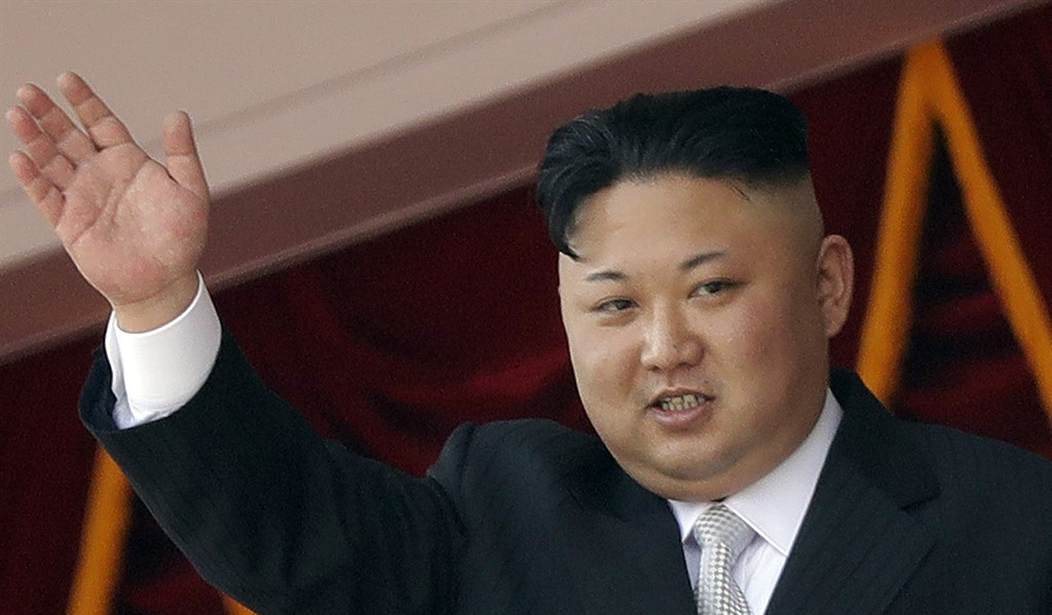That’s not the first question for policymakers, but it’s the nagging issue that matters most. After North Korea’s decision to take a pass on its missile test in waters near Guam, the first question to ask is whether this amounts to a blink in the brinksmanship between Pyongyang and Washington. And if so, who gets the credit?
On Fox & Friends, Stuart Varney gives the credit to Trump, with justification:
VARNEY: We’ve put pressure on North Korea, and they’re listening. pic.twitter.com/EQ1wPAemhg
— FOX & friends (@foxandfriends) August 15, 2017
Trump has made it clear — in blunt language — that he will tie trade issues to China’s response on North Korea. China has objected to that linkage, but still seems to have gotten the message. On the other hand, they’re still engaging in a massive amount of trade in order to make up for the sanctions that have been imposed with their blessing, so that’s a bit of a mixed bag at best.
It may also be true that China has become worried over the direction taken by its client state. They don’t want reunification on South Korean terms, and wind up with a Western-friendly capitalist state on the Yalu, but they don’t want a nuclear war on their border either. The launch of ICBMs put the US in a position where they had no choice but to respond, something China understood too. That may well be why Beijing told the Kim regime — and the North Korean military — that they’d be on their own if they provoke a war by doing something insanely stupid like, oh, firing missiles at Guam.
That’s almost assuredly what made Kim blink, but Trump can still claim credit for that by refusing to dial down his rhetoric after the ICBM tests. The Guam attack looked like a ploy from the start to back down in this round of brinksmanship. The target itself made little strategic sense, and then it morphed from a ring of fire around the island to a test shot 25 miles short of it. Kim made a pretense of having the plan prepared by his general staff for his approval, so that he could magnanimously reject it … for now, anyway.
Rex Tillerson wants to take advantage of this brief interregnum of sanity to get Kim back to the table in multi-lateral talks. He’s not exactly holding his breath, but the Secretary of State wants to emphasize again the diplomatic options open to Pyongyang:
US Secretary of State Rex Tillerson says Washington remains ready for talks, after North Korea’s Kim Jong-Un postponed a threat to fire missiles toward the US territory of Guam.
But the top US diplomat says it is up to Kim when such negotiations would begin, having previously insisted Pyongyang must demonstrate that it accepts it will have to give up its nuclear program.
“I have no response to his decisions at all at this time,” Tillerson says, when asked about Kim’s decision to hold off. “We continue to be interested in finding ways to get to dialogue, but that’s up to him.”
But is there much to discuss? Politico wonders whether it’s even possible to disarm North Korea of its nukes, and whether we should redirect our efforts to containment:
The debate over the once-unthinkable option has sharpened in recent weeks as a growing number of security experts, former spies and ex-diplomats say North Korea’s nuclear arsenal and advancing missile force have progressed too far to make disarming it a realistic goal.
Instead, they say, the U.S. should focus on containing Kim Jong Un’s regime, as it did with Josef Stalin’s Soviet Union and Mao Zedong’s China when they went nuclear. In those cases, the U.S. used the threat of overwhelming retaliation to deter them from using their weapons, then later offered incentives for the USSR and China to limit or reduce their nuclear stockpiles.
President Donald Trump’s White House advisers disagree — most prominently national security adviser H.R. McMaster, who argued Sunday that “classical deterrence theory” won’t work with a regime that “engages in unspeakable brutality against its own people.”
But a growing number of people inside and outside the government who have dealt directly with North Korea believe Washington must come to terms with the likelihood that Kim’s government won’t give up its nuclear arsenal, which it sees as its insurance policy against foreign aggression. That means the United States and its key Asian allies must develop a strategy to keep a lid on North Korea’s nuclear threat, preferably before it fully masters the ability to threaten the U.S. mainland.
North Korea has had nuclear weapons for well over a decade, and probably has had the capability to launch them on missiles for at least four years. No country that has progressed this far has ever voluntarily surrendered its nuclear-weapons program. Libya, which surrendered its program after Moammar Qaddafi watched the US take Saddam Hussein out of a spider hole in 2003, had only an early-stage development of nuclear weapons. Perhaps a formula could be found short of a catastrophic war to remove nuclear weapons, but it would cost far more than the US and its allies would pay out to satisfy Kim’s economic and security needs. The point of no return on nukes has passed, and probably passed more than a decade ago or even earlier than that.
The events of the past week actually show some promise for containment. When the US stopped being passive about our intentions and started speaking bluntly about the consequences of this program, both China and North Korea took notice. That gives some hope that the Kim regime is rational enough to understand that an exchange would cost them everything.








Join the conversation as a VIP Member